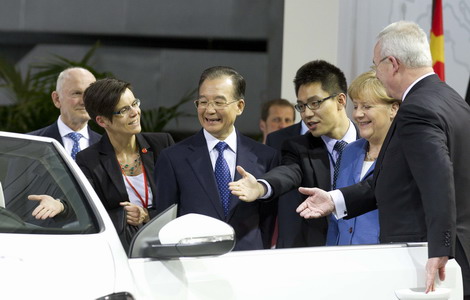|
 |
|
Premier Wen Jiabao and German Chancellor Angela Merkel (second right) are invited to sit in a car during a visit to the Volkswagen headquarters in Wolfsburg, Germany, on Monday. [Photo / Associated Press] |
Factory in western region to start production in 2013
Auto giant Volkswagen on Monday sealed a deal to build a new factory in China - where it plans to invest 14 billion euros ($18 billion) in five years - as visiting Premier Wen Jiabao and German Chancellor Angela Merkel attended the signing ceremony at the corporation's headquarters.
The ceremony in Wolfsburg, the last event on Wen's agenda during his 24-hour stay in China's largest European trade partner, was largely symbolic. News of the plan had crossed continents for months.
But observers say the gesture came at a relevant time as China and Germany celebrate 40 years of diplomatic relations amid Berlin's push to save the eurozone.
"Right now, bilateral cooperation is in the broadest, most vibrant and most fruitful period ever," Wen told a China-Germany business summit in Hannover on Monday.
The strategic nature of Sino-German relations "can only be strengthened, not diminished" as the two countries work together to fuel the global recovery, he said.
The Volkswagen deal, which involves opening a plant in Northwest China's Xinjiang Uygur autonomous region that will be capable of producing up to 50,000 vehicles a year starting 2013, responded to Wen's cures for the European debt crisis during an earlier speech he gave at an industrial fair in Hannover on Sunday.
Development of the real economy, innovation and collaboration would drive the recovery, he said.
With 27 percent of its cars sold in China last year, Volkswagen, the world's largest automaker, sold a record 633,000 vehicles in China in the first quarter of 2012.
Combining German technological expertise and competitive advantages that have driven its own growth, Beijing has described its cooperation with Berlin as win-win.
Wu Hongbo, China's ambassador to Germany, said development in bilateral relations has been "very rapid and highly stable".
Volkswagen's joint venture experience in China, analysts say, bears testament to close ties between the two countries.
China was the top foreign investor in Germany in 2011, development agency Germany Trade and Invest said last month.
Ties between the two powerhouses have deepened significantly since Merkel took office in 2005. Merkel and Wen have each visited the other's country five times since.
The China element is also highlighted at the ongoing Hannover Messe, a leading industrial fair Wen opened and addressed, along with Merkel, on Sunday.
China is the sole partner country of the fair this year.
Only 24 Chinese companies were present in the fair in 1987, the last time China was the Hannover Messe's partner country. More than 500 Chinese companies came to the show this year, which attracted some 5,000 exhibitors from 69 countries and regions.
"Close cooperation and joint efforts by China and Germany, two of the world's most important manufacturing powers, to push for dialogue and collaboration among players in the global industry are set to play an ever more vital role for the industry's innovation and development," Wen said at the fair on Sunday.
Earlier that day, he reiterated China's willingness to join hands with Germany and the rest of Europe to overcome the crisis in a meeting with former German chancellor Gerhard Schroder.
Beijing aims to "convey confidence and strength to the world" through the Hannover exhibition, he said.
Schroder, meanwhile, applauded Chinese measures in fighting the crisis, and said Germany and China share "important consensuses and common benefits".
Wen also met Helmut Schmidt, the first German chancellor to visit China since Beijing and Berlin established diplomatic relations.
Germany has increased cooperation with China, especially after Merkel was reelected chancellor in 2009, when she cast eyes more on bilateral pragmatic cooperation rather than their ideological differences, Zhao Junjie, an expert on European studies at the Chinese Academy of Social Sciences, told China Daily.
Bilateral cooperation since then has been notable in areas including climate change, stability and security in Eurasia and the trend of economic and trade cooperation between Asia and Europe, said Zhao.
The Chinese premier arrived in Sweden, the third leg of his eight-day trip to Europe, from Wolfsburg on Monday.
The trip, which earlier took him to Iceland, will conclude in Poland on Friday.
Contact the writers at [email protected] and [email protected]
